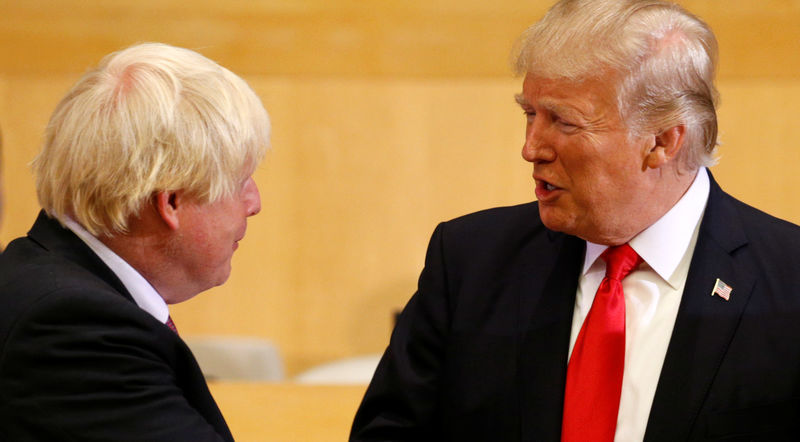By William James
BIARRITZ, France (Reuters) - Prime Minister Boris Johnson used a pre-G7 summit phone call to U.S. President Donald Trump to demand he lower trade barriers and open up parts of the U.S. economy to British firms, citing a wide range of markets from cars to cauliflowers.
The two spoke on Friday ahead of the meeting of world leaders in the French resort of Biarritz, where they are expected to talk up the prospect of a bilateral trade deal once Britain leaves the European Union.
"There is a massive opportunity for Britain but we must understand that it is not all going to be plain sailing," he said during his flight to France, relaying details of the call to travelling reporters.
"There remain very considerable barriers in the U.S. to British businesses which are not widely understood."
Johnson listed what he said were restrictions or tariffs on shower base units, wallpaper, fabric, cars, railway carriages, pork pies, cauliflowers, micro-brewery beer, insurance, public procurement contracts, bell peppers, wine and rulers.
Brexit advocates, including Johnson, have hailed the ability to strike free trade deals with countries such as the United States as one of the main benefits of leaving the EU. Critics say the terms that Trump will demand are likely to damage the British economy in the long run.
The two leaders are due to meet in person on Sunday morning, which is expected to result in more positive talk about a trade deal, building on a previous promise made by Trump to agree a "fantastic" deal.
Nevertheless, Johnson has used the trip to indirectly criticise Trump, saying a global trade war needed to de-escalate, and that those responsible for rising tariffs could be held responsible for damaging the world economy.
Wary of Britain being seen as what French President Emmanuel Macron called a "junior partner of the United States", the government has also in recent days sought to dampen down the idea of a swift bilateral agreement, stressing that they would not rush into a one-sided deal.
"There are massive opportunities for UK companies to open up, to prise open the American market," Johnson told reporters.

"We intend to seize those opportunities but they are going to require our American friends to compromise and to open up their approach because currently there are too many restrictions."